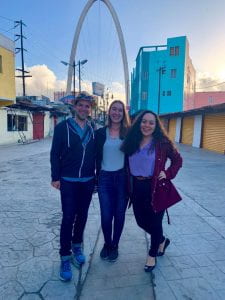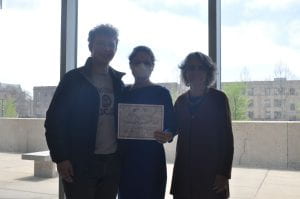
Katie Koza, ’23, and Austin Feuer, ’22, with Professor Emily Buss after NLG won the Student Organization Pro Bono Award at the 2022 Pro Bono Recognition Ceremony
By Emma Stapleton, ’24
Today we write to spotlight a letter writing campaign put on by the UChicago Law Chapter of the National Lawyers Guild in service of Pushing Envelopes (formerly known as Black & Pink Chicago). National Lawyers Guild (NLG) is an LSO that strives to inform and advocate for considerations of social and economic justice in the study of law, hopes to involve young lawyers in their professional and social duty to their community, and pushes for laws that protect the economic and social welfare of the people. Pushing Envelopes is an abolitionist network of LGBTQIA2S+ individuals experiencing incarceration and allies. Pushing Envelopes is dedicated to abolishing the criminal punishment system and liberating LGBTQIA2S+ people and people living with HIV/AIDS who are affected by the system through advocacy, support, and organizing.
The letter writing campaign allows students to use their legal research skills in order to help LGBTQIA2S+ individuals experiencing incarceration find answers to legal questions. Pushing Envelopes receives the initial letters from individuals with their legal queries and law students respond to these letters under the supervision of NLG student coordinators and prisoners’ rights attorneys at Loevy & Loevy.
To get a sense of the great work student pro bono volunteers are doing within the letter writing campaign, I spoke with the Katie Koza (3L) and Allie O’Connor (2L), who are two of the three co-coordinators of the campaign in this year alongside Gabrielle Seiwert (2L). Katie also served as a co-coordinator for the previous year. Here’s what they have to say about the project:
How or why did you choose to get involved with the letter writing campaign?
Katie Koza, 3L: I got involved with the project during the winter break of my 1L year. I knew precious little about legal research and writing at the time, but I refused to let that stop me. Doing this pro bono work was a great way to use the knowledge I was starting to gain in the service of others.
Allie O’Connor, 2L: I began volunteering for the letter writing campaign during my 1L year, in part because that first year made me feel disconnected from the communities I had hoped to serve when I entered law school. Beyond that, I appreciated the opportunity to communicate directly with incarcerated people and learn firsthand about their experiences and challenges. I also felt that NLG and Pushing Envelopes’ intersectional and abolitionist approach aligned with my values.
What does a typical “assignment” or correspondence process look like? How does the project function?
Katie: Typically, LGBTQ+ incarcerated people will send letters to our contact person at Pushing Envelopes Chicago, Rob Sobczak, or to our contact person at Pushing Envelopes Milwaukee. If the letters are from incarcerated people who are seeking legal information, the Pushing Envelopes contact people will forward the letters to us. Then, we co-coordinators meet and read the letters, trying to determine which aspects of the letters we will be able to have students respond to. That’s a particularly interesting step in the process, since we need to think through how the queries in the letters will map onto specific angles for legal research. Next, we solicit law student volunteers using our listserv and assign students to letters. Sometimes students work in teams, and we often try to pair more experienced writers with less experienced writers. The students usually have two weeks to write the responses, which they then send back to us. After we review the student responses, we send them to civil rights attorneys at the law firm, Loevy & Loevy, who have graciously volunteered to help us. The attorneys weigh in with any suggested changes, which the students implement. Then we send the response letters back to our contact points at Pushing Envelopes and get ready for the next batch!
What has been the most impactful part of your work with the letter writing campaign, and what have you learned from the project?
Katie: When I see my fellow students eagerly step up to write letters or become co-coordinators, I feel more hopeful about the future of the legal profession and about civil rights. Sometimes it can be daunting to confront entrenched systems of mass incarceration and homophobia, but when I have zealous advocates by my side, it energizes me.
Through this project, I have also become more acutely aware of the ways that prison environments often become especially toxic for people who are transgender. Factors like sexual harassment and the denial of gender-affirming medical care compound in ways that are unhealthy and unjust. As members of the legal community, we have an obligation not to turn a blind eye to this injustice, but rather, to use our legal skills in opposition to it.
Allie: One specific thing I’ve learned more about is the work of jailhouse lawyers and the efforts people make to teach themselves about the law and advocate for their rights. A good number of the people who write us letters are familiar with the laws applicable to their issues or have ideas about a legal strategy they want to pursue. While we as law students can’t provide them legal advice within this project, we do our best to bolster their knowledge with further research. The work of jailhouse lawyers is just one example that illustrates how important and valuable it is to center the voices and lived experiences of incarcerated people when we talk about prisoners’ rights and the prison industrial complex.
The Pro Bono Service Initiative supports students with an interest in performing pro bono work during their time at the Law School. The Initiative encourages all students to pledge 50 hours of service before graduating to aid vulnerable groups and communities, to hone tangible and intangible skills to round out their law school learning, and to experience hands-on legal work that will truly affect others. For more information about how to make the pledge and all things pro bono, visit the Pro Bono Service Initiative website here.
For more information about joining the Pushing Envelopes letter writing campaign, please contact Katie Koza (kmkoza@uchicago.edu), Allie O’Connor (akoconnor@uchicago.edu) or Gabrielle Seiwart (gabrielle4@uchicago.edu). They will be recruiting new letter writers this fall. Special thanks to Katie Koza and Allie O’Connor for taking the time to share more about the campaign.
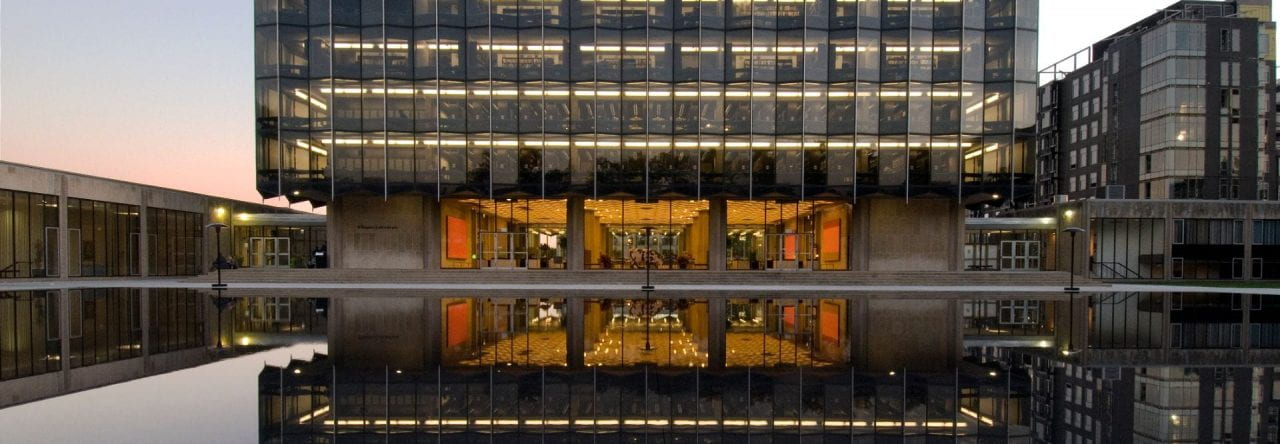
 By So Jung Kim, ’23
By So Jung Kim, ’23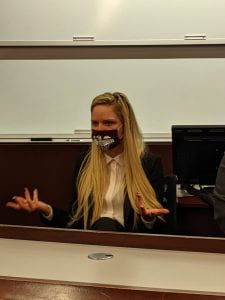 Pro bono work is serious work that impacts real people’s lives, as demonstrated by a few anecdotes. This summer, Jacqueline answered a call for assistance to support intake on bases for Afghan refugees who fled the regime change after the American military withdrawal. She was deployed alongside litigators, who were also new to immigration law, to the East Coast to receive new arrivals and let them know about their rights and the resettlement process. Because of the urgency of the situation, sometimes they served as social workers providing backpacks and pregnancy tests or mobilizing other resources for families.
Pro bono work is serious work that impacts real people’s lives, as demonstrated by a few anecdotes. This summer, Jacqueline answered a call for assistance to support intake on bases for Afghan refugees who fled the regime change after the American military withdrawal. She was deployed alongside litigators, who were also new to immigration law, to the East Coast to receive new arrivals and let them know about their rights and the resettlement process. Because of the urgency of the situation, sometimes they served as social workers providing backpacks and pregnancy tests or mobilizing other resources for families.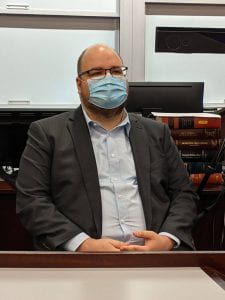 During his internship with the Center for Disability and Elder Law, Rob worked directly with clients to assist with estate planning, property tax exemptions, and many other legal issues. He often worked with clients facing complex problems and was responsible for spotting and helping to resolve underlying legal issues that the clients might not have been aware were contributing to their problems.
During his internship with the Center for Disability and Elder Law, Rob worked directly with clients to assist with estate planning, property tax exemptions, and many other legal issues. He often worked with clients facing complex problems and was responsible for spotting and helping to resolve underlying legal issues that the clients might not have been aware were contributing to their problems.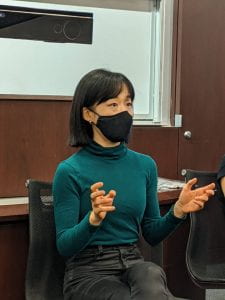 year is to build in group opportunities for PILS members to participate in pro bono together and foster more connection across class years. Nevertheless, 1Ls should not be afraid to volunteer for work because they may feel too new to the law. Sometimes lessons from first-year doctrinal classes may appear in real life and deliver results for the clients. Host organizations are the experts and prepared to train pro bono volunteers (e.g., manuals, slide decks, shadowing an attorney, templates from past work) and give them work that they can handle. Mostly, they want students’ willingness to learn and problem-solving skills. Indeed, many legal aid organizations have dual missions to serve their clients’ immediate needs and also to integrate pro bono work into the legal profession. Regardless of the onboarding process, panelists recommended asking questions and seeking feedback early and often on assignments, but after doing some due diligence first.
year is to build in group opportunities for PILS members to participate in pro bono together and foster more connection across class years. Nevertheless, 1Ls should not be afraid to volunteer for work because they may feel too new to the law. Sometimes lessons from first-year doctrinal classes may appear in real life and deliver results for the clients. Host organizations are the experts and prepared to train pro bono volunteers (e.g., manuals, slide decks, shadowing an attorney, templates from past work) and give them work that they can handle. Mostly, they want students’ willingness to learn and problem-solving skills. Indeed, many legal aid organizations have dual missions to serve their clients’ immediate needs and also to integrate pro bono work into the legal profession. Regardless of the onboarding process, panelists recommended asking questions and seeking feedback early and often on assignments, but after doing some due diligence first.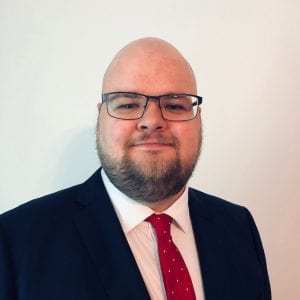 with Rob to learn more about his pro bono experience with CDEL.
with Rob to learn more about his pro bono experience with CDEL.



